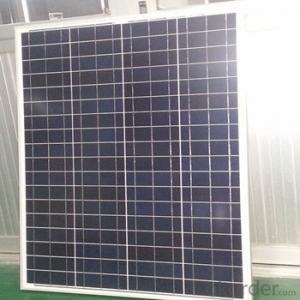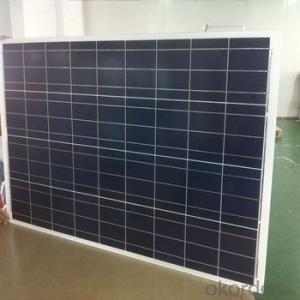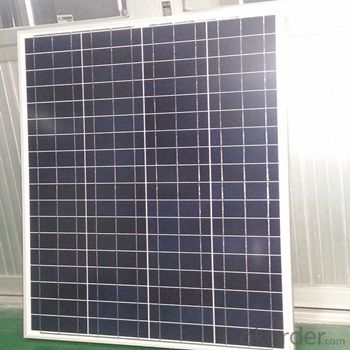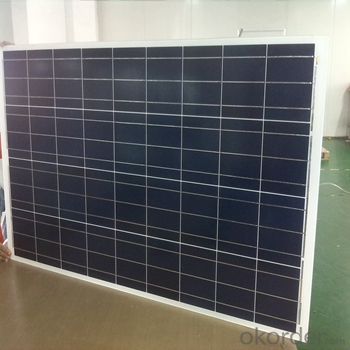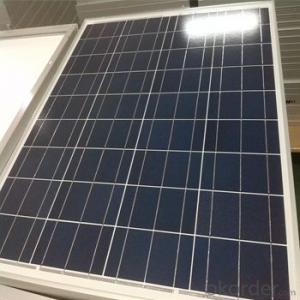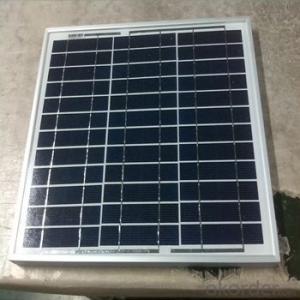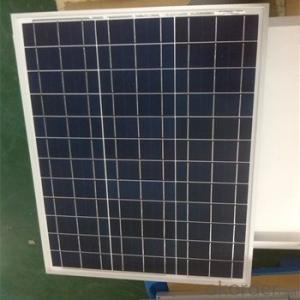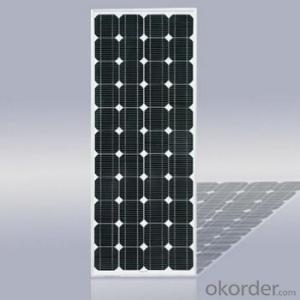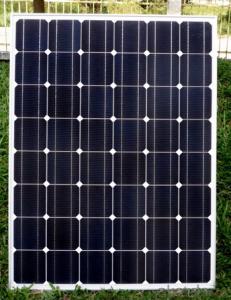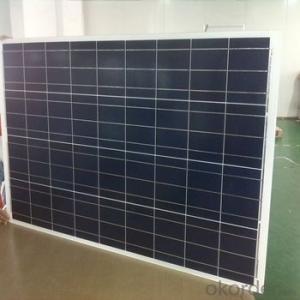Sunmac Solar Panels - Polycrystalline Solar Module 100W CNBM Series
- Loading Port:
- Shanghai
- Payment Terms:
- TT OR LC
- Min Order Qty:
- 25 pc
- Supply Capability:
- 20000 pc/month
OKorder Service Pledge
OKorder Financial Service
You Might Also Like
Polycrystalline Solar Module-100w CNBM Series
High efficiency crystalline solar cell. Even if under the weak light, the solar module can produce maximum power output.
II Tempered glass (toughened glass): Anti-reflecting coating and high transmission rate glass increase the power output and mechanical strength of solar module.
III EVA and TPT: Using high quality EVA and TPT to prevent destroying and water.
IV AI frame: Without screw, rner connection. 6 holes on the frame can be installed easily.
V Junction box: Multi function junction box with water proof.
VI Long lifetime: ≥25 years; Less power decrease.
VII Good performance of preventing from atrocious weather such as wind and hails.
VIII Resisting moisture and etching effectively, not effected by geology.
IX The certificate issued by international authority: UL, TUV, IEC, CE.
Standard Test Conditions of Polycrystalline Silicon Solar Panel
The opto-electrical specifications shown below are stabilized values being measured at Standard Test Conditions, Irradiance: 1000W/m2, Spectrum: AM1.5 at 25°C, The info below is subject to manufacturing tolerances. Where appropriate minutes of measurement are available and are used for the dimensioning of the installation.
Advantages of Monocrystalline Silicon Solar Panel
• CNBM Solar performance guarantees for 25 years
• 12 years guarantee for workmanship
• Timeliness of delivery
• Quality Products certified (TÜV, UL, CE, ISO)
Specification
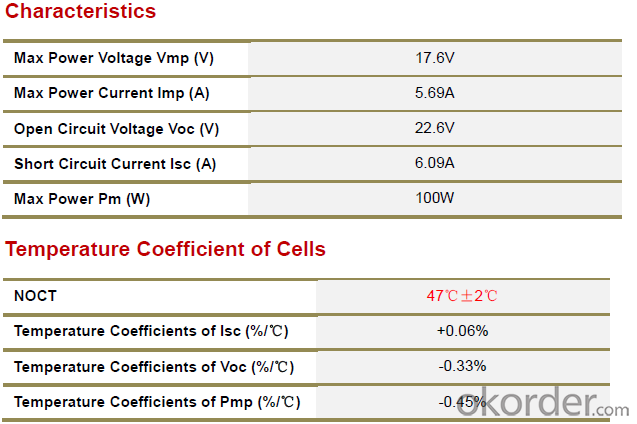
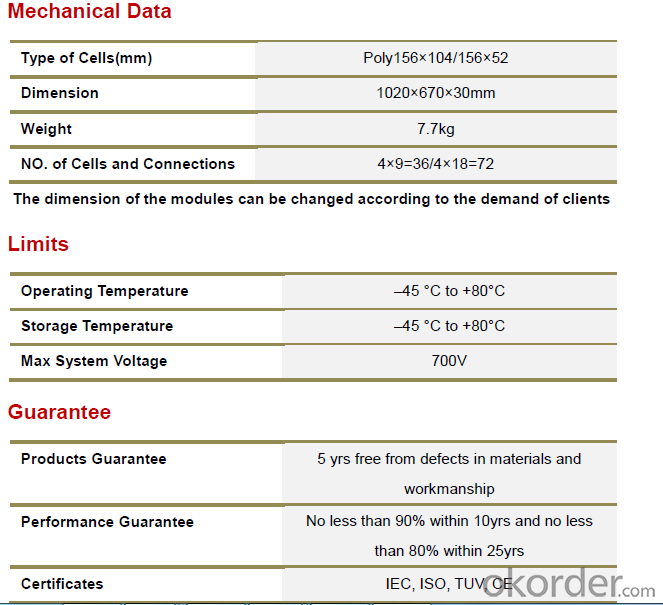
Certification
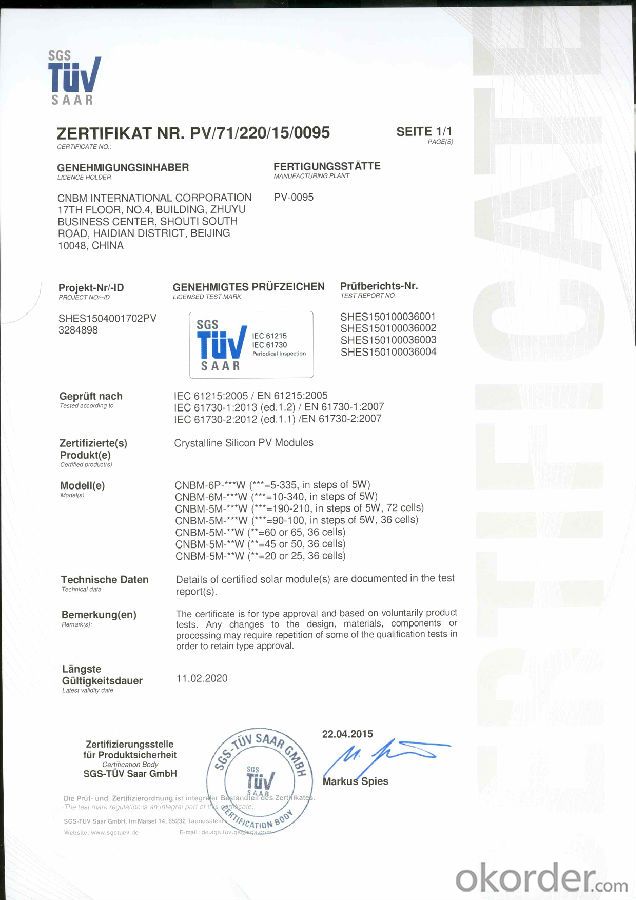
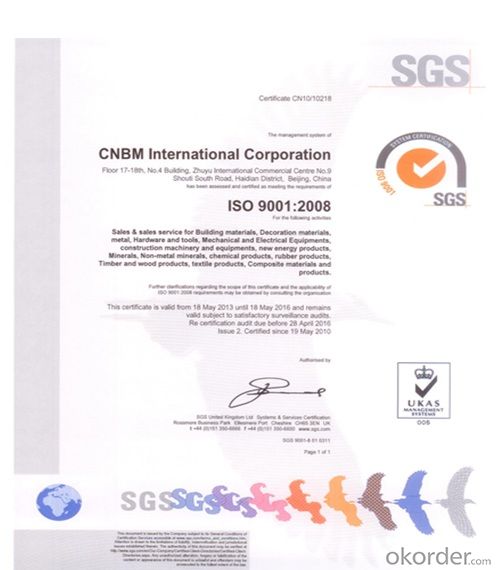
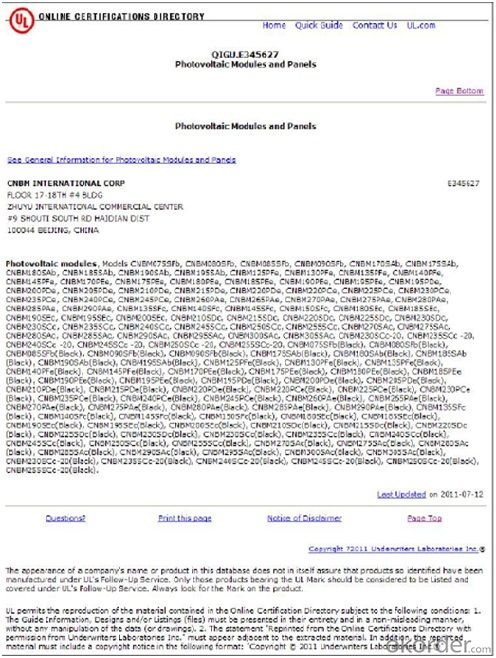
FAQ
We have organized several common questions for our clients,may help you sincerely:
①What price for each watt?
It depends on the quantity, delivery date and payment terms,
②What is your size for each module? Can you tell me the Parameter of your module?
We have different series of panels in different output, both c-Si and a-Si. Please take the specification sheet for your reference.
③Can you provide the peripheral products of the solar panels, such as the battery, controller, and inverter? If so, can you tell me how do they match each other?
Yes, we can, we have two companies for solar region, one is CNBM International, the other is CNBM engineering Co.
We can provide you not only the solar module but also the off grid solar system, we can also provide you service with on grid plant.
④What is your warranty system?
Our product performance guarantees for 25 years
• 12 years guarantee for workmanship
• Timeliness of delivery
• Quality Products certified (TÜV, UL, CE, ISO)
⑤How do you pack your products?
We have rich experience on how to pack the panels to make sure the safety on shipment when it arrives at the destination.
⑥ Can you do OEM for us?
Yes, we can.
⑦How long can we receive the product after purchase?
In the purchase of product within three working days, We will arrange the factory delivery as soon as possible. The pecific time of receiving is related to the state and position of customers.Commonly 7 to 10 working days can be served.
- Q: What is the difference between solar panels and light panels?
- Silicon solar cells are divided into monocrystalline silicon, polysilicon, amorphous silicon, silicon thin film solar cells and several. At present, the world's most widely used solar cells are silicon solar cells, in large-scale applications and industrial production is still dominated by the penetration rate of 90% or more, monocrystalline silicon solar cell photoelectric conversion efficiency of the highest technology is also the most mature.
- Q: How do solar panels affect the property's operating costs?
- Solar panels can significantly reduce a property's operating costs by generating clean and renewable electricity. By harnessing sunlight, solar panels can power various appliances and systems, reducing or even eliminating the need to rely on expensive grid electricity. This can lead to substantial savings on utility bills, making solar panels a financially sound investment for property owners.
- Q: Can solar panels be used in countries with limited sunlight?
- Yes, solar panels can still be used in countries with limited sunlight. While solar panels are most effective in regions with abundant sunlight, they can still generate electricity in areas with less sunlight. Even countries with limited sunlight exposure can benefit from solar energy by utilizing advanced solar technologies and optimizing panel placement to maximize energy production. Additionally, solar panels can still generate electricity on cloudy or overcast days, although at a reduced efficiency compared to sunny days.
- Q: Can solar panels be used for powering electric fences?
- Yes, solar panels can be used to power electric fences. Solar panels can generate electricity that can be stored in batteries and used to power electric fence systems, providing a reliable and eco-friendly source of energy for the fences.
- Q: How much space do solar panels require?
- The amount of space required for solar panels can vary depending on factors such as the type and size of the panels, their efficiency, and the energy needs of the system. On average, an average-sized residential solar panel system typically requires around 100-400 square feet of roof space. However, ground-mounted systems can require larger areas, and more efficient panels can generate the same amount of electricity in a smaller space.
- Q: I have an inverter and a battery 20 Amperes.Daily sun shine approx. 7 Hours.Do I need to buy anything or should I connect the solar panel to the Battery direct?
- No, don't connect the panel directly to the battery. You need to isolate the solar panel charging output from the AC-powered charger. A couple of high-current diodes arranged with their anodes connected to the charging sources in the positive supply line will allow either the charger or the solar panel to lift the voltage high enough to charge the battery, albeit with about 0.6 volts dropped across the diode. Both cathode ends would be connected to the battery. This arrangement allows a positive current to flow from either or both charging sources at the same time, although in practice, one will generally be higher than the other. Also, if the AC charger's voltage is significantly higher than the solar panel, the charger may always charge the battery. You would need to regulate its output to be slightly lower than the solar panel when it's near it's minimum useful operating voltage. (note that the 0.6 forward bias voltage on the diode might prevent the solar panel from completely charging the battery if it has any voltage regulation on its output)
- Q: I live in Los Angeles area, I see the ads that, they will install solar panel for $0. I would like to know what is the catch ?Thanks You.
- Read the terms and conditions! They will own the panel and receive payment for any power generated from it, as one example.
- Q: Green issues aside, are solar panels worth it, monetarily speaking?I don't mean that my house might be worth more or any of that. All I am asking is this: if I invest in a set of solar panels, will the cost be paid back to me over time? If so, how long will it takegt;Take into account the following:. Currently I pay the electric company around $00 per month2. I use around 400 kilowats of energy per monthI realize that exact numbers are hard to come by, but any opinions are welcome.
- I'm confident that you must pick up everything concerning solar power at www.okorder .
- Q: I have been thinking about getting solar panels for my house. What do you think I should get? Companies? Prices? I also have another question. How much energy can a small solar panel produce?
- A small panel will not produce much power. When people put solar electric panels on their house with the goal of saving money, they generally put up a lot of large panels - 200 or 500 square feet worth. Its hard to save money with just one panel. The only way to get close on how much it will cost and whether that represents a savings is to get out your electric bills for the past year, and call a local solar installer for a quote. The system on our house cost $20,000 and we got back $8,000 in incentives, so $2,000 net. It can save money, but that will be over many, many years.
- Q: I am writing some mock legislation for a school club and I need to know some of the environmental effects of solar panels. Also, where can I find specific studies(like from colleges and/or universities) proving these benefits as well as benefits and reasons of going green.
- Hi there, as a great starting point take a look here okorder Should give you most of what you require
Send your message to us
Sunmac Solar Panels - Polycrystalline Solar Module 100W CNBM Series
- Loading Port:
- Shanghai
- Payment Terms:
- TT OR LC
- Min Order Qty:
- 25 pc
- Supply Capability:
- 20000 pc/month
OKorder Service Pledge
OKorder Financial Service
Similar products
Hot products
Hot Searches
Related keywords
